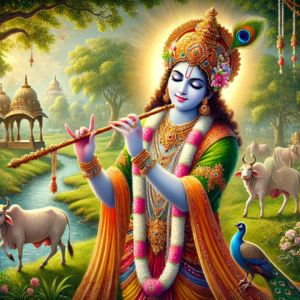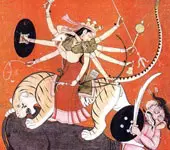अयनेषु च सर्वेषु यथाभागमवस्थिताः।
भीष्ममेवाभिरक्षन्तु भवन्तः सर्व एव हि॥ (11.1)
ayaneṣu ca sarveṣu yathā-bhāgam avasthitāḥ
bhīṣmam evābhirakṣantu bhavantaḥ sarva eva hi (11.1)
Meaning
In all the strategic positions, the commanders must station themselves properly and protect Bhishma from all sides.
In this shloka, Duryodhana is emphasizing the importance of protecting their key warrior, Bhishma, as they prepare for battle. This verse is part of Duryodhana's strategic instructions to ensure the strength and morale of his army by safeguarding their most experienced and revered warrior.:
Duryodhana is instructing his commanders to take their positions along the front lines of the battlefield. He stresses that all the warriors should be positioned as per their strategic importance and roles. Importantly, he orders that Bhishma, the commander-in-chief of the Kaurava forces and one of the most formidable warriors, be given utmost protection. This highlights Bhishma's critical role in the Kaurava army and Duryodhana's reliance on his prowess and experience to lead them to victory. By ensuring Bhishma's protection, Duryodhana aims to maintain the strength and morale of his troops.
Today's context - A wartime scenario
During wartime, the president of a nation (or Prime minister or Monarch) is at risk due to heightened threats from the enemy.
Security measures are intensified to protect the president. This includes secure locations, enhanced personal security detail, and restricted movement to prevent any attempts on his life. These measures ensure that the president can continue to lead, make critical decisions, and inspire the nation without interruption.
The protection of the nation's leader is paramount for several reasons-
Central Decision-Making Role:
Just as Bhishma’s strategic acumen was vital for the Kaurava army, the leader’s guidance is essential for the effective prosecution of the war.
The head of the nation is typically involved in making critical strategic decisions during wartime. Their ability to analyze situations, give directives, and coordinate various aspects of the defense strategy is crucial.
Symbol of National Unity and Morale:
Bhishma's presence on the battlefield provided strength and confidence to the Kaurava troops, the leader’s presence provides a psychological edge and a sense of stability.
The head of the nation often symbolizes the unity and resolve of the country. His presence and leadership can significantly boost the morale of both the military and the civilian population.
International Representation:
Bhishma’s role was not just as a warrior but also as a respected elder and strategist, whose presence influenced both allies and adversaries.
The head of the nation represents the country in the international arena, managing alliances, seeking support, and negotiating with other nations. Their protection ensures that diplomatic channels remain open and effective.
Continuity of Governance:
In the battlefield context, Bhishma’s protection maintained the hierarchical integrity and fighting spirit of the Kaurava army.
Protecting the head of the nation ensures the continuity of governance and prevents chaos and confusion. It maintains the chain of command and preserves the structure of the government.
Key Takeaways
- Strategic and strong leadership is crucial for crisis management such as war.
- It ensures uninterrupted command over military and governmental operations.
- A strong leader’s presence boosts morale of military and civilians.
- A strong head of the nation symbolizes unity and stability, strengthening national spirit.
- He maintains active and effective diplomatic efforts.
- He secures international support and shapes global policies.
- Utmost attention should be given to the personal security and safety of the nation.
Comments
Read more comments
Knowledge Bank
Which is the biggest enemy of bhakti?
Bhakti's biggest enemy is the desire for worldly pleasures. It would both prevent the dawning of bhakti, and slow down progress in the path of bhakti.
Which Veda deals with medicine?
Atharva Veda
Recommended for you
Why You Should Wash Your Hand After Touching Cooked Rice

Understand the real meaning of this tradition in the context of Srimad Bhagavata....
Click here to know more..Durga as Lakshmi. Vritti, and Smriti

Surya Pratassmarana Stotram

praatah' smaraami khalu tatsaviturvarenyam roopam hi mand'alamri'cho'tha tanuryajoomshi.....
Click here to know more..